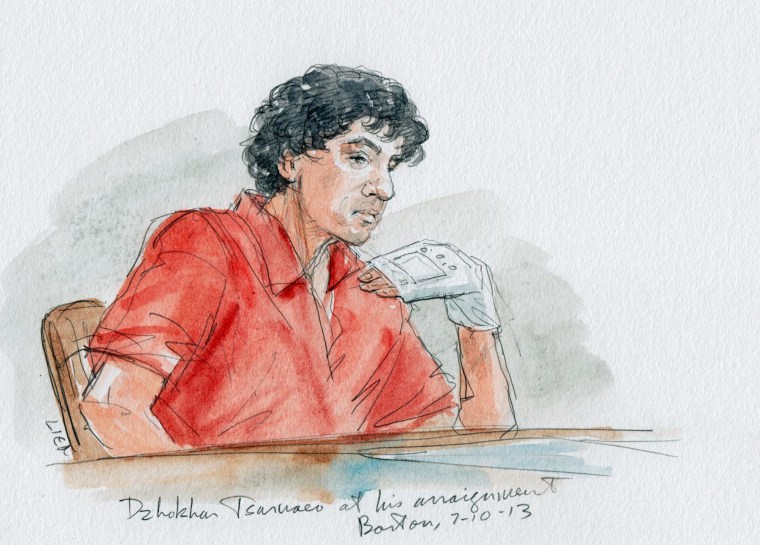The surviving suspect in the Boston Marathon bombings that killed three people and wounded 264 more faces 27 charges that, if he is found guilty, could lead to the death penalty. And as the city still grapples with the tragedy one year later, defense lawyers are tasked with defending a suspect accused of carrying out one of the most terrorizing domestic attacks in recent American history.
Two big decisions await the lawyers for suspect Dzhokhar Tsarnaev before his November trial — whether to seek a change of venue and whether to have the defendant change his plea to guilty.
Moving the trial out of the Boston courthouse, less than two miles from the marathon's finish line, would get away from a city still traumatized by the attack, but one poll showed a majority of Boston residents oppose the death penalty for Tsarnaev. And Massachusetts is one of 18 states that have abolished capital punishment. So a change of venue might not be to his advantage.
His lawyers must also decide whether to urge him to plead guilty, if the government would agree to not seek the death penalty. Many high-profile terror defendants end up pleading guilty, including would-be underwear bomber Umar Abdulmutallab and Faisal Shazad, who attempted to set off a car bomb in New York's Times Square in 2010.

Tzarnaev is now 20, held without bail at a federal medical prison outside Boston. In recent court filings, his lawyers have signaled that they'll make his age an issue.
At the time of the bombing, they note, his older brother Tamerlan was 26 and he was 19. Tamerlan, they say in a recent court filing, "had a substantially longer and deeper engagement than his younger brother with extremist and violent ideology."
Legal experts say that's a clear indication of one theory they will pursue if the case goes to trial as scheduled on Nov. 3.
"They are trying to preview some sort of a defense for him that limits his culpability for what occurred, even if the government may have very strong evidence and may be able to prove that he was factually involved," says Pete White, a Washington, D.C., defense lawyer and former federal prosecutor.
A similar legal strategy worked for Lee Boyd Malvo, one of two men convicted in the Washington, D.C., sniper shootings 12 years ago, when he was 17. He escaped the death penalty. The much older of the two, John Allen Muhammad, was sentenced to death and executed.
The government insists it has strong evidence in the Boston case, including photos of Dzhokhar Tsarnaev with his brother that depict them carrying backpacks along the race route. Prosecutors also say they have video of the younger Tsarnaev appearing to set his backpack down at the spot where the second bomb went off, then walking away.
Retired FBI agent Richard DesLauriers, who led the investigation, says finding that video was the key.
"I knew, and my joint terrorism task force agency heads, when they saw the video shortly after I did, we knew we had the video image of at least one of the bombers."
Tsarnaev is accused of committing four murders — three people killed by the blasts near the finish line and an MIT campus policeman shot during the ensuing manhunt — and prosecutors have filed 18 separate counts for those killings.
But Tsarnaev's lawyers say that's duplication, unfairly stacking the deck. They'll be in court Wednesday, asking the judge to throw some of them out.